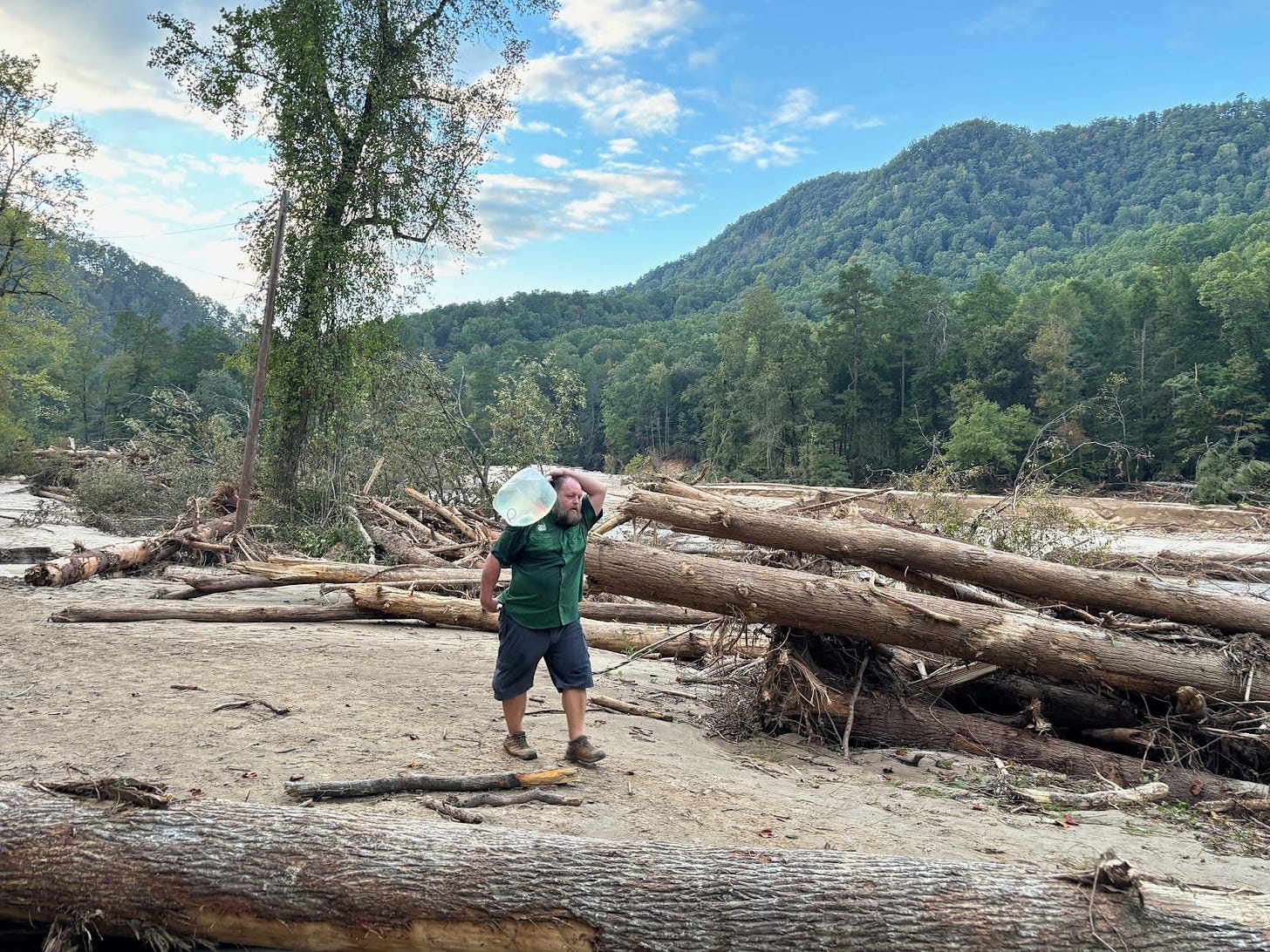State lawmakers pass $273M relief bill
Plus: About 83,800 N.C. customers still without power; Asheville water restoration still weeks away; Sheryl Crow, Keith Urban join ‘Concert for Carolina’; How Waynesville conducted swift water rescues
You’re reading Mountain Updates, a free pop-up newsletter from The Charlotte Ledger examining the crisis and recovery in the N.C. mountains. Ledger subscribers can add Mountain Updates on their “My Account” page.
Sign up for free:
State lawmakers this afternoon approved what is expected to be the first of several aid packages for Western North Carolina.
Leaders in the General Assembly quickly passed a $273 million disaster relief bill that would get some of the initial money flowing. The vote was 113-0 in the House and 48-0 in the Senate. It will go to Gov. Roy Cooper.
House Bill 149, deemed “the Disaster Recovery Act of 2024,” earmarks $250 million to the Division of Emergency Management, which would be the state match for some federal money, as well as serve as a loan fund for state agencies and local governments that are awaiting federal reimbursement.
The bill also designates money for schools ($16 million), local governments ($2 million) and elections ($5 million).
The estimated damage of Helene in North Carolina is in the billions. The proposed bill is likely one of multiple spending plans to restore the western part of the state coming in the future.
“This is just the first step,” Senate leader Phil Berger said in a news conference this morning, according to WRAL.
North Carolina’s rainy day fund currently has $4.75 billion, and there’s an additional $733 million in an emergency response and disaster reserve account.
The bill also allows school boards in the 25 counties declared a disaster area to waive up to 20 missed instructional days and provides flexibility to establish remote learning during the current school year. School districts in four counties have been closed “indefinitely,” and a timeline for reopening has not been set. In a normal North Carolina school year, public schools are required to have 185 days of instruction.
It also relaxes some rules for counties in the disaster zone, such as:
establishing a moratorium on construction fees
giving flexibility on water and wastewater infrastructure spending
allowing open burning of storm debris without a permit
extending deadlines for collecting Covid-era business loans
postponing due dates for certain state taxes
waiving certain DMV fees, highway construction permits and contracting requirements
“I promised I wouldn’t cry, but people are still needing help, even though we didn’t ask for it,” Rep. Jennifer Balkcom, R-Henderson, said in the news conference, according to WRAL. “This is just a start. This is a start to give people what they need.”
Let’s check in on news coming out of Western North Carolina today:
Another power update: As of noon yesterday, Duke Energy reported about 83,800 in North Carolina and 6,500 customers in South Carolina are still without power. “In some cases, homes, businesses and critical power grid equipment no longer physically exist. Also, in some places, Duke Energy remains unable to access and assess areas due to road and infrastructure destruction,” the update said. Since Hurricane Helene, Duke Energy Carolinas has restored power to 2.6 million customers.
Charlotte benefit concert just got bigger: Bank of America Stadium announced today that Sheryl Crow, Keith Urban and Bailey Zimmerman will join the already star-studded line-up of performers at the “Concert for Carolina” on Oct. 26. The concert, which will go toward relief efforts in Western North Carolina, was announced on Monday with Luke Combs, Eric Church, Billy Strings and James Taylor.
Some Asheville hospital patients transferred: Mission Health is transferring patients from three of its Asheville facilities due to the ongoing city water outage. Mission Hospital is consolidating resources to address urgent medical needs and transferring low-acuity patients to other hospitals. The main challenge remains the lack of municipal water, although contingency plans, including water trucks, are in place at some facilities. (WLOS)
Henderson County school district reopens: Students will return to Henderson County Public Schools on Tuesday, Oct. 15, after more than two weeks of being closed. (Asheville CitizenTimes)
Another benefit concert in Wilmington: The City of Wilmington announced a hurricane relief concert on Oct. 29 called “From Wilmington, With Love,” that will feature Ben Folds and musicians from Western North Carolina. Proceeds will go to the North Carolina Disaster Relief Fund, managed by United Way of North Carolina.
Two iconic hiking trails closed: Hurricane Helene has caused significant damage to the Appalachian Trail and Mountains-to-Sea Trail, making many sections impassable due to downed trees, landslides and washed-out paths. While parts of the Appalachian Trail remain open, many sections are closed, and the extent of the damage will determine when the trails can fully reopen, potentially affecting thru-hikers in 2025. (Charlotte Observer)
Davidson student flies in supplies: Jackson Schulz, a Davidson College student and licensed pilot, and his flight school, Race City Flight Operations, transformed their facility into a donation center and have flown critical supplies to Western North Carolina, also participating in search and rescue missions. You can read more about Schulz’s experience in this article from Davidson College.
‘Redneck Air Force’ on the scene: A volunteer group nicknamed “Redneck Air Force” in Buncombe County is flying supplies to remote areas affected by Hurricane Helene, ensuring basic necessities reach isolated communities. (WLOS)
Water restoration is ‘still potentially weeks away’ for parts of Asheville, Swannanoa and Black Mountain
The City of Asheville Water Resources, which serves Asheville and surrounding areas like Swannanoa and Black Mountain, called customers Tuesday afternoon with an update on water restoration. The city water system hopes to connect the 36-inch bypass line at the North Fork treatment plant with the distribution system by Thursday or Friday — but that does not mean customers will have water.
“There remains a substantial amount of repairs left to be done on the distribution system,” said the voicemail from the city’s water resources public information officer, Clay Chandler. “Full system restoration is still potentially weeks away.”
The water in the North Fork Reservoir, the freshwater source in Black Mountain created by a dam in the Swannanoa River, is full of sediment from Hurricane Helene. Pushing the turbid water through the filters would “damage them beyond repair, setting us back months in the restoration process.”
The city is working with the U.S. Environmental Protection Agency on turbidity-reducing measures, but “there is no guarantee we’ll be able to safely deploy them or if they’ll work if we do,” Chandler said.
The only fool-proof way is to wait for the sediment to settle on its own, but uncontrollable weather events — like additional rain — could slow down this natural process, Chandler added.
The Mills River plant, which serves south Asheville, has been operating normally but requires work to connect pockets of customers still without water.
A boil water advisory is in effect for people with water, and the city is asking customers to conserve water.
Watch: Swift water rescues in Waynesville
In this 4.5-minute video from The Mountaineer, Haywood County’s newspaper, the Waynesville Fire Department explains how it performed swift water rescues — from fighting strong currents to breaking through windows — during Hurricane Helene’s initial flooding.
Waynesville fireman Doug Smith also gave a run-down on the equipment that’s required to perform these types of rescues.
Photo of the day: For some folks in remote areas, water has to be hiked in
Many people are still without running water, and for those who live in areas unaccessible by vehicle, freshwater deliveries sometimes arrive on foot, like the picture above taken outside of Saluda in Polk County. (Photo courtesy of Adam Purser)
How to help
Many organizations have deployed groups across the region, tasked with distributing food, water and supplies. You can donate to their efforts at the links below.
Hearts with Hands, a local disaster relief organization, has a donation page to provide food, supplies and water.
United Way of North Carolina has established a fund to help residents affected by the flooding.
MANNA Foodbank, which serves 16 counties in Western North Carolina, is accepting food, supplies and monetary donations. The organization’s warehouse on Swannanoa River Road in Asheville was damaged by the hurricane.
The American Red Cross is accepting donations to help residents in the Southeast.
Samaritan’s Purse, which is headquartered in Boone, is scheduling volunteers to help with debris cleanup.
Operation Blessing has a donation page to provide food, supplies and water.
—
Lindsey Banks, a native of the Buncombe County town of Swannanoa, is a staff reporter with The Charlotte Ledger. Reach her at lindsey@cltledger.com.
Need to sign up for this e-newsletter? We offer a free version, as well as paid memberships for full access to all of our local newsletters:
➡️ Opt in or out of different newsletters on your “My Account” page.
➡️ Learn more about The Charlotte Ledger
The Charlotte Ledger is a locally owned media company that delivers smart and essential news through e-newsletters and on a website. We strive for fairness and accuracy and will correct all known errors. The content reflects the independent editorial judgment of The Charlotte Ledger. Any advertising, paid marketing, or sponsored content will be clearly labeled.
Like what we are doing? Feel free to forward this along and to tell a friend.
Social media: On Facebook, Instagram, Twitter and LinkedIn.
Sponsorship information/customer service: email support@cltledger.com.
Executive editor: Tony Mecia; Managing editor: Cristina Bolling; Staff writer: Lindsey Banks; Business manager: Brie Chrisman





